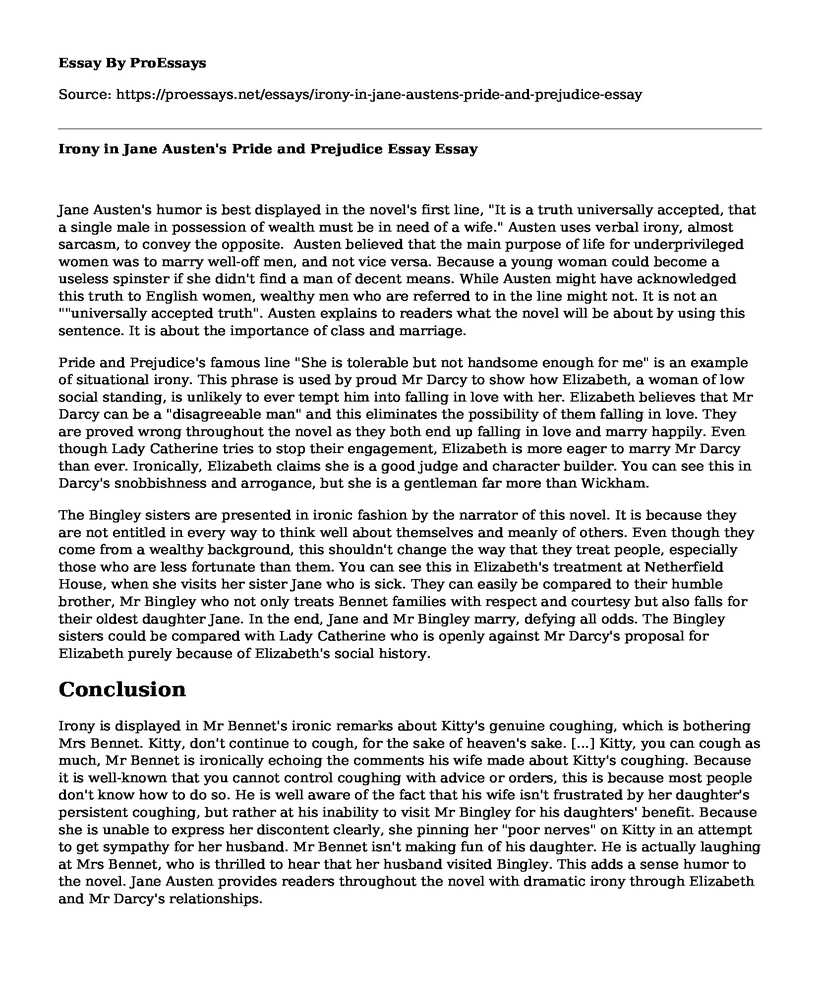Jane Austen's humor is best displayed in the novel's first line, "It is a truth universally accepted, that a single male in possession of wealth must be in need of a wife." Austen uses verbal irony, almost sarcasm, to convey the opposite. Austen believed that the main purpose of life for underprivileged women was to marry well-off men, and not vice versa. Because a young woman could become a useless spinster if she didn't find a man of decent means. While Austen might have acknowledged this truth to English women, wealthy men who are referred to in the line might not. It is not an ""universally accepted truth". Austen explains to readers what the novel will be about by using this sentence. It is about the importance of class and marriage.
Pride and Prejudice's famous line "She is tolerable but not handsome enough for me" is an example of situational irony. This phrase is used by proud Mr Darcy to show how Elizabeth, a woman of low social standing, is unlikely to ever tempt him into falling in love with her. Elizabeth believes that Mr Darcy can be a "disagreeable man" and this eliminates the possibility of them falling in love. They are proved wrong throughout the novel as they both end up falling in love and marry happily. Even though Lady Catherine tries to stop their engagement, Elizabeth is more eager to marry Mr Darcy than ever. Ironically, Elizabeth claims she is a good judge and character builder. You can see this in Darcy's snobbishness and arrogance, but she is a gentleman far more than Wickham.
The Bingley sisters are presented in ironic fashion by the narrator of this novel. It is because they are not entitled in every way to think well about themselves and meanly of others. Even though they come from a wealthy background, this shouldn't change the way that they treat people, especially those who are less fortunate than them. You can see this in Elizabeth's treatment at Netherfield House, when she visits her sister Jane who is sick. They can easily be compared to their humble brother, Mr Bingley who not only treats Bennet families with respect and courtesy but also falls for their oldest daughter Jane. In the end, Jane and Mr Bingley marry, defying all odds. The Bingley sisters could be compared with Lady Catherine who is openly against Mr Darcy's proposal for Elizabeth purely because of Elizabeth's social history.
Conclusion
Irony is displayed in Mr Bennet's ironic remarks about Kitty's genuine coughing, which is bothering Mrs Bennet. Kitty, don't continue to cough, for the sake of heaven's sake. [...] Kitty, you can cough as much, Mr Bennet is ironically echoing the comments his wife made about Kitty's coughing. Because it is well-known that you cannot control coughing with advice or orders, this is because most people don't know how to do so. He is well aware of the fact that his wife isn't frustrated by her daughter's persistent coughing, but rather at his inability to visit Mr Bingley for his daughters' benefit. Because she is unable to express her discontent clearly, she pinning her "poor nerves" on Kitty in an attempt to get sympathy for her husband. Mr Bennet isn't making fun of his daughter. He is actually laughing at Mrs Bennet, who is thrilled to hear that her husband visited Bingley. This adds a sense humor to the novel. Jane Austen provides readers throughout the novel with dramatic irony through Elizabeth and Mr Darcy's relationships.
Cite this page
Irony in Jane Austen's Pride and Prejudice Essay. (2022, Aug 08). Retrieved from https://proessays.net/essays/irony-in-jane-austens-pride-and-prejudice-essay
If you are the original author of this essay and no longer wish to have it published on the ProEssays website, please click below to request its removal:
- The Titans of Greek Mythology
- Resistance in 'The Moon is Down' Essay
- The Pollution Caused by Oedipus - Essay Sample
- Characters and the Society in the Great Gatsby and the Brave New World - Critical Essay
- Poetry Analysis Essay on Kites by Raymond Souster
- Emily Dickinson: A Positive Romantic Poet - Essay Sample
- Essay Sample on Education System: Outdated and Unjustified?







